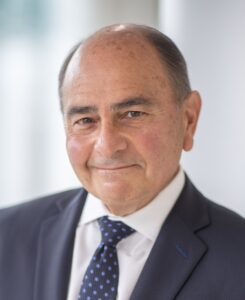 2 min read July 2021 — In an interview with Invest:, Donald Gintzig, president and CEO of WakeMed Health & Hospitals, discusses WakeMed’s central role in the community. The health system has been able to meet the challenges of the pandemic while relying on its esprit de corps to maintain staff morale. WakeMed continues to push proactive initiatives that will keep patients well rather than help them when they’re already sick.
2 min read July 2021 — In an interview with Invest:, Donald Gintzig, president and CEO of WakeMed Health & Hospitals, discusses WakeMed’s central role in the community. The health system has been able to meet the challenges of the pandemic while relying on its esprit de corps to maintain staff morale. WakeMed continues to push proactive initiatives that will keep patients well rather than help them when they’re already sick.
How did WakeMed successfully manage the challenges posed by the pandemic?
It has obviously been a very interesting and challenging year. Folks may not know it, but the first positive case of COVID-19 last year was on March 3 in Raleigh. The Triangle is an international area, so it’s no surprise that somebody who arrived here had been exposed to it. If you look at the data issued by the CDC, WakeMed cared for more patients than any other institution in the Triangle. That’s because we’re also a community-based safety-net hospital –we are where people come when they are very sick. The pandemic also has had a greater impact on people of color and those who are marginalized. We are fortunate to be able to care for everyone in a pretty large area and have long-standing relationships with minority communities and vulnerable patient populations – meaningful connections that date back many decades. At the end of the day, we respond to what our community needs, whether it’s hurricanes, disasters, floods, trauma, or, as it was last year, a pandemic.
How did you face the challenge of staff burnout during the pandemic?
It has been a challenge. We are taking care of really sick people all the time anyway. We had to make sure that our teams knew that we were doing everything as a community health system to keep our staff, their families and our patients safe. It was important for employees to know we were exercising every available resource with the least amount of exposure risk as possible. There was a lot of communication, and constant updates, about the risks and about the CDC guidance. By the time we were giving regular —weekly, daily — updates on what the virus was doing, we were putting together a pretty robust resource that everyone in our organization could tap into. Our spiritual care, human resources and leadership teams were able to come together and ensure that no one felt alone in this crisis.
Has WakeMed Health’s Accountable Care Organization achieved what it set out to?
One of WakeMed’s key aspects and one of our aspirational goals is value. Our mission is to improve the health and well-being of the community but also to be a leader in value. In 2013, we sat down and partnered with a very large primary care, independent physician’s association and thought about how we could work together to improve the health of a population, increase access and get the right care at the right price. We were one of the first accountable care organizations in North Carolina, and I think the 16th-largest in the country, and I think it has worked out very well as we’ve worked through the population health spectrum. We’ve done this primarily through shared savings. If we are able to keep people healthy, we can offer services at a lower rate since the insurers, employers and accountable care organizations get some savings. That is the return. Ultimately, we don’t want to provide care in a more expensive setting when it could be done in a less expensive out-patient setting.
What are WakeMed’s priorities moving forward?
We are implementing efforts to grow the physician network – WakeMed Physician Practices. We’ve been thinking of where healthcare is going: how do we expand access for all? How do we reduce disparity? And how do we engage our community’s businesses and families in that health journey? I think we all want to reduce the cost of healthcare, and the way to do that is to not get sick. If we focus on health and well-being overall, we won’t need to be spending as much on people after they’re already sick. As a community-based health system, the healthier our community is, the closer we’ve come to achieving our mission. That’s the key. So, growing primary care, urgent care, home care — we even offer hospital services at homes now, which, ultimately, is a cost saver — are the ways to do this. We want to provide expanded access to primary care that will help people, both early in life and late in life, maintain their health.
For more information, visit:
